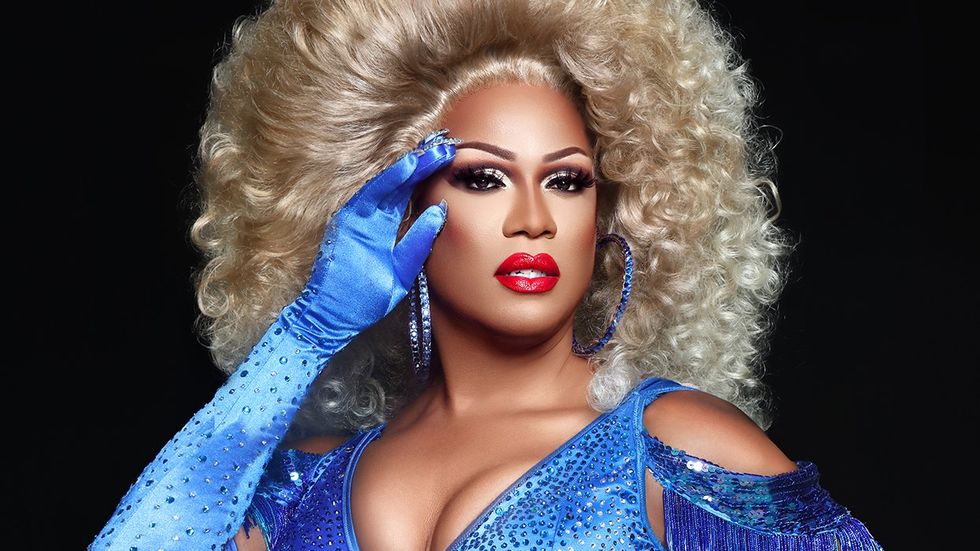How Shequida Hall turned grandmas manners into Manhattan mayhem
If you have ever wondered what happens when a Jamaican-born kid with operatic pipes meets Manhattan's neon nightlife, Shequida Hall is the answer. It was almost 11 at night when we met up, yet the energy at the club was as electric as a first set of performers at a Sunday drag brunch. The crowd was shouting and clapping for their preferred performer, and at the heart of it all was one of New York's finest performers.A Downtown Diva Grows UpRaised by a formidable grandmother who forbade patois at home and insisted on "proper English," the matriarch also showed Hall unconditional love. Even before knowing her identity, her grandmother was there: "One day she pulled me aside, and she's like, just be yourself. I love you as you are, and people will learn to love you just for who you are." That moment became emotional scaffolding for a career built on audacity. Yet Shequida's big bang was a pure accident. One school night in the early 90s, friends slapped a straw hat, blonde wig, negligee, and combat boots on her and marched her to a club. The kid who'd never set foot in a club got her first booking before her first cocktail. "Someone came up to me like, 'I love your lookWant to work here?'" she recalls, still incredulous. It was none other than New York's infamous partyer, Lee Chappell, whose fabled party needed fresh energy. And Shequida, red lipstick crooked and all, was suddenly on the payroll. The Accidental Architect of OpportunityFast-forward to the Aughts, when backstage shade at a Downtown competition pushed her from performer to producer. "If you wanted a gig, you had to wait until someone passed or someone invited you in to perform at their club or their venue or their show," Shequida reflects on her own experiences in New York's drag scene. "And I vowed if I ever had the opportunity, that I would literally give a stage to these new performers to do what they want to do, show who they are, because that's the only way you'll ever get in." And, in 2010, that promise materialized as DRAG WARS: The Next Generation. Shequida HallJeff Eason for Shequida HallThe Monday-night showdown has since minted queens who skipped off to RuPaul's Drag Race: Aquaria, Brita Filter, Jasmine Kennedy, and Jiggly Caliente, among others (though, Shequida jokes, "not one sent me a single dollarmy Venmo is Help-a-Bitch.) But the goal was never just TV glory. "My job at DRAG WARS is just to be a glamorous doorman, like somebody at the front door of the Ritz Carlton," she says. "All I'm doing is opening the door and holding it open for you to walk through." That philosophy means DRAG WARS isn't a Hunger Games bloodbath; it's a launchpad where newcomers get lighting, crowds, andcruciallya mother who reminds them to tip the DJ and hydrate between numbers. Why NYC Drag Still Takes Nerve"Everybody comes to New York City, and everybody wants to be famous," Shequida laughs. "The competition is stiffand in the words of Paris Is Burning, it do take nerve to perform here." In her view, the city's revolving cast of bright-eyed transplants is less of a threat than ferocious. Neighborhoods shift; dive bars may gentrify into brunch spots, but drag keeps evolving into something delightfully disobedient. That disobedience is political. "Freedom is being able to wear a dress, put on a wig, do drag if you want," she declares. "Freedom to be who you want to be, how you want to be." In an era when anti-drag bills crawl through statehouses, DRAG WARS doubles as a weekly protest: sequins in the face of rising censorship, high-kicks in the face of hate. Opera Meets Eye ShadowBefore the lashes and late-night antics, Shequida trained at Juilliard. Thus, she has a range that lets her riff on Whitney mid-split while also gliding through Mozart's coloratura. "My two loves are singing and drag," she says. This spring, she married them in a new venture, Sing For Your Life, at Hell's Kitchen's Balcon Salon. Belters lug sheet music, nail an 11 o'clock number, leave with a demo reel, and, maybe, a future booking. "Once again, I was never given a lot of opportunities. I am grateful for the ones that I did get," she affirms. "[I'm] always about giving people opportunities." Shequida HallJeff Eason for Shequida HallAsk for career advice for an aspiring drag performer, and she'll smack it with Jamaican realness: "Don't do it. It's painful: the corsets, the heels, the tuck." Then she softens into mother mode: march to your own drum, win with grace, and lose with a smile. And, because slots in a lineup are like Manhattan leases, "Nobody hires a cunt." Professionalism, she insists, is the real lip gloss. And this is coming from a lifetime of being a queer professional: her grandmother's stoop taught her quiet power; Julliard taught her technique; the Roxy taught her how quickly a stranger's compliment can rewrite a destiny. So when culture critics fret that TikTok queens in Fashion Nova will devalue "real" drag, Shequida shrugs. New York is reinvention. If a performer leaves DRAG WARS and snags a Hulu deal, the ecosystem works. If a singer graduates from Sing For Your Life to America's Got Talent, it's the same deal. The point is that doors stay open, even if Shequida has to hold them herself. Perhaps drag isn't about viral death drops or top-shelf gowns but the quiet, grandmother-approved promise to "just do." Shequida Hall keeps doing: holding doors, staging wars, singing arias, and painting on the same joy that first electrified her under the Roxy's lights. New York may keep changing outfits, but as long as she's here, freedom and opportunity will still look like a straw hat, bad red lipstick, and the sense to love yourself each and every time you step out in the world.




